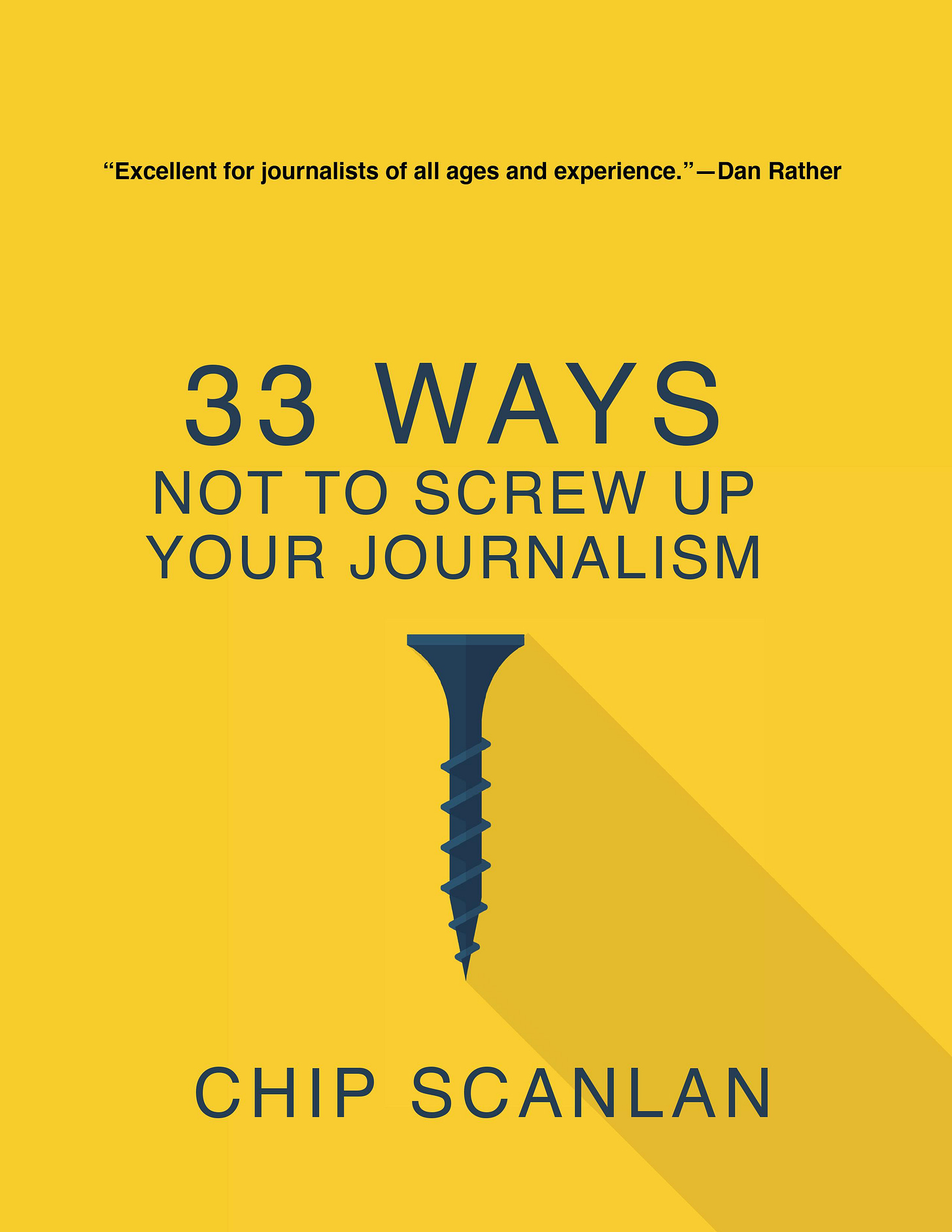Chip’s Writing Lessons is a reader-supported publication. To receive new posts and support my work, consider becoming a free or paid subscriber.
In this issue:
Writers Speak | Robert Gottlieb on the editor’s role
Interview | 4 Questions with Ava Kofman
Reading to savor | “Final Report of the Select Committee to Investigate the January 6th Attack on the United States Capitol,” December 22, 2022
Tip of the Week | Steer clear of Tom Swifties
Help Royal Hospitallers save lives in Ukraine
WRITERS SPEAK
“Editing is intelligent and sympathetic reaction to the text and to what the author is trying to accomplish. When you try to change something into something that it isn’t, rather than make it better at what it is, tragedy lurks. It’s not your book.”
- Robert Gottlieb
Chip’s Writing Lessons is a reader-supported publication. To receive an Extras package in addition to my free newsletter, become a paid subscriber for $5 a month, $50 a year, or $150 annually to become a Founding Member.
INTERVIEW | 4 QUESTIONS WITH AVA KOFMAN
Ava Kofman (@AvaKofman) is a reporter on ProPublica’s national desk. She joined the newsroom in January 2019, after working as a contributing writer at the Intercept, where she covered algorithms, artificial intelligence and surveillance technology. In 2020, she reported with colleagues on toxic air pollution across the United States. Their award-winning work on America’s “Sacrifice Zones” was credited with helping spur reforms. Kofman previously edited the New Inquiry. Her work has also appeared in the New York Times Magazine, Harper’s Magazine, and the Atlantic, among other publications. She lives in Los Angeles.
What’s the most important lesson you’ve learned as a writer?
Revise. Revise again. Then one more time. Apologize profusely to your editor for all of the tiny changes you are making. Continue to make them. Some of the most lively moments in a story come from second-guessing and last-minute additions, cuts and tweaks. The story will need to be published eventually, but until it is, consider it unfinished.
What has been the biggest surprise of your writing life?
It only gets harder! I suppose this is an open secret, but I’ve been continually surprised that the more I learn (or try to learn) about writing, the harder it gets. Thomas Mann puts it this way: “A writer is someone for whom writing is more difficult than it is for other people.”
If you had to use a metaphor to describe yourself as a writer, what would it be?
I once heard that there are two ways to approach a first draft: as a diamond polisher or as a garbage compressor. I tend to do both. I start with the latter technique, ingesting and processing vast amounts of material and refuse. The writing in this phase feels like a lot of trash that would be unreadable to another person (and that I sometimes can barely understand myself). Eventually, though, the pressure and heat starts to produce some ideas, phrases, sentences and paragraphs. I would hesitate to call these gems, but they are durable enough to begin polishing.
What’s the best piece of writing advice anyone ever gave you?
Start writing! And start earlier than you think. The longer you wait, the harder it gets. You can always do more reporting later. Even if you’re just writing a memo, or “fake writing,” or pretending to write, start putting something down on the page. (Plus, the more material you produce, the more you’ll be open to revising it.) I wish I could attribute this to a single wise source, but this advice has been given to me a thousand times by a thousand wise people. (Thank you to all of them.) I regret how often I fail to follow it.
READING TO SAVOR | FINAL REPORT OF THE SELECT COMMITTEE TO INVESTIGATE THE JAN. 6TH ATTACK ON THE UNITED STATES CAPITOL. 117TH CONGRESS, SECOND SESSION HOUSE REPORT 117-663
Congressional hearing reports can make an effective sleeping pill. I know, having waded through a fair share of them during my five years as a Washington correspondent. The final report of the select committee to investigate the Jan. 6, 2021 attack on the Capitol stands in stark contrast to the somnabulatory prose of the genre. Just as the committee used the power of sights and sounds in the hearings themselves — videos of the attack, interviews and other striking audio and visual presentations — it brings the power of narrative to its final judgment in print form.
Its report, available online, is a riveting tale of horrific actions and diabolical intrigue told in story form using characters, dialogues and scenes.
The narrative approach becomes clear from the first three paragraphs — a significant detail lead, which uses a detail to speak volumes about a news event, or introduce tension — of Committee Chairman Bennie G. Thompson’s (D-Miss.) foreword:
“We were told to remove our lapel pins. At the start of every new Congress, House Members are presented with lapel pins. They are about the size of a quarter and carry a seal of a bald eagle. On a routine day in the Capitol, there are thousands of tourists, advocates, and workers. Typically, the pins are an easy way to spot House Members. However, on January 6, 2021, the pin that once was a badge of honor and distinction turned into a bullseye.”
After a lengthy but gripping executive summary, the report breaks up its case —that former President Donald J. Trump and what the report calls his “co-conspirators” bear ultimate responsibility for the deadly assault on the Capitol that day — into eight dramatically granular chapters, buttressed by thousands of footnotes. I returned again and again to its 814 pages over several days to not only re-experience the event that I’d already read and watched so much about, but to learn new details that had eluded me and to gain the most complete understanding of this seismic event in American history. It’s odd to say, but this is one government report that’s a great read.
(The report’s landing page also links to additional supporting materials provided by the committee, including videos, transcripts and other documents on file.)
TIP OF THE WEEK | STEER CLEAR OF TOM SWIFTIES.
One of the clearest signs of an inexperienced writer is the use of speaker attribution that echoes the dialogue. “My leg hurts,” he groaned. “You’re the best,” she beamed. “That’s funny,” he chuckled. The most flagrant abuses of this principle are “Tom Swifties,” named after the hero of a long-running series of juvenile science fiction and adventure novels famous (or infamous) for their punning attribution.
● “I’d like to stop by the mausoleum,” Tom said cryptically.
● “Pass me the shellfish,” said Tom crabbily.
● “We just struck oil!” Tom gushed.
● “I have no flowers,” Tom said lackadaisically.
● “I forgot what I needed at the store,” Tom said listlessly.
There’s no need for attribution to convey meaning already contained in dialogue. And it’s best to keep speaker attribution, also known as a dialogue tag, simply, to “said,” Renni Browne and Dave King maintain in “Self-Editing for Fiction Writers: How to Edit Yourself into Print.” That way you don’t draw the reader’s attention from what the speaker is saying.
Verbs other than “said” jump out at the reader, making them aware, if only for a second, of the mechanics of writing. Think of “said” more like a punctuation mark than a verb, and thus, “graceful and elegant,” they write.
HELP UKRAINIAN PARAMEDICS SAVE LIVES
Royal Hospitallers, Ukrainian's brave volunteer paramedic battalion, save lives every day. Please support them here!
BEFORE YOU GO
If there’s one person — a journalist, writer, student, teacher or coach — you think would benefit from the interviews, craft lessons, writing tips, and more that appear every two weeks in this free newsletter, please suggest they subscribe @chipscanlan.substack.com
If you’d like to tangibly support Chip’s Writing Lessons and my work, please consider becoming a paid subscriber for $5 a month or $50 a year or for $150 a year to become a founding member. Once a week, these members receive an Extras package featuring fresh interviews with leading writers and editors, excerpts from my books of writing advice, excerpts from my African memoir in progress, more inspirational quotes, glimpses into the world of publishing, coaching tips and more recommended readings and listening options.
NOW AVAILABLE
33 Ways Not To Screw Up Your Journalism
Writers on Writing: Inside the lives of 55 distinguished writers and editors
“By asking four questions to 55 of our finest writers and editors, Chip Scanlan has hosted one of the greatest writing conferences you will ever attend." - Roy Peter Clark, The Poynter Institute, “Writing Tools”
"A marvelous book for writers, people who have a passion for writing, or simply, who want to become writers. Yet what strikes me about this book is that it is not just for writers only." - The Blogging Owl
AND
Writers on Writing: The Journal
Available on Amazon or online through Tombolo Books,
a local independently-owned bookstore
chipscan@gmail.com | +1-727-366-8119. Feel free to call. Always happy to give a free 30-minute consultation.
Thanks for reading. See you in two weeks.
May your writing and editing go well.
Chip
Like this post
Chip’s Writing Lessons is a reader-supported publication. To receive new posts and support my work, consider becoming a free or paid subscriber.
Subscribed






